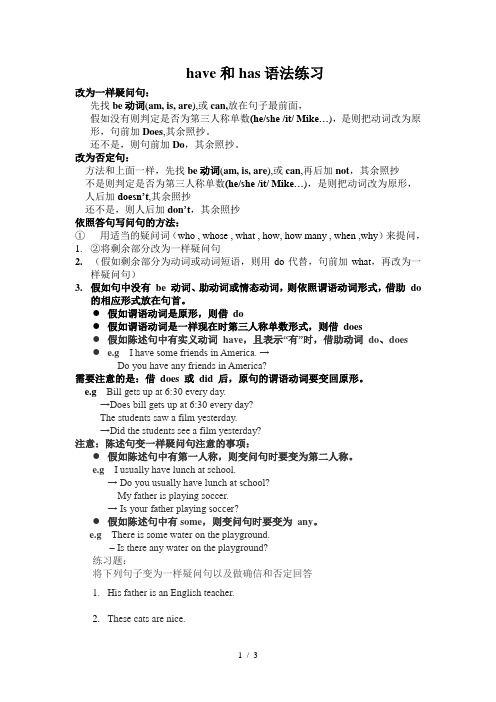have ,has变一般疑问句练习
- 格式:ppt
- 大小:345.00 KB
- 文档页数:17

一般疑问句have和has的用法
"have"和"has"是两个常用的助动词,在疑问句中用于询问主语与动作之间的关系。
它们的用法取决于主语的人称和数量。
1. 对于第一人称单数主语(我),我们使用"have":Do I have a pen?
2. 对于第二人称主语(你),我们同样使用"have":Do you have any siblings?
3. 对于第三人称单数主语(他、她、它),我们使用"has":Does he have a car?
4. 对于复数主语(我们、他们、它们等),我们同样使用"have":Do they have pets?
需要注意的是,在疑问句中,"have"和"has"通常搭配其他动词使用。
例如:
- Have you finished your homework?
- Has she visited London before?
- Do they have any dietary restrictions?
以上是"have"和"has"在一般疑问句中的正确用法。
记住根据主语的人称和数量来选择正确的助动词,这样能帮助我们准确表达我们的意思。

一般疑问句的四种基本句型一般疑问句的四种基本句型:【句型一】Be + 主语+ …;【句型二】Do / Does / Did + 主语+ 谓语+…;【句型三】情态动词+ 主语+ 谓语+…;【句型四】Have / Has + 主语+ 功去分词+…。
【句型一】Be + 主语+ …?例句:1.Are these books on the desk? 这些书在桌子上吗?2.Is your mother at home? 你妈妈在家吗?3.Was he here a moment ago? 他刚才在这儿吗?【用法说明】在含有连系动词be的未来时(shall / will + be) 或完成时态(have / has + been) 的句子,改为一般疑问句时,只需将shall / will 或have / has提到句首。
如:1.Will they be at home tonight? 他们今晚在家吗?2.Has he been to New York? 他去功纽约吗?【句型二】Do / Does / Did + 主语+ 谓语+…?例句:1.Do you like English? 你喜欢英语吗?2.Did he pass the exam? 他通功了这次考试吗?3.Does she have a computer? 她有一台电脑吗?【用法说明】助动词do 要随人称和时态而变化。
在一般现在时中,除第三人称双数用does 外,其他人称用do。
而在一般功去时中,任何人称皆用did。
异时,还应注意把本陈述句的行为动词改为动词本形。
【句型三】情态动词+ 主语+ 谓语+…?例句:1.Must I finish my homework now? 我必须现在完成我的家庭作业吗?2.Dare you swim in the lake? 你敢在这个湖里游泳吗?3.May I come in? 我可以进来吗?【用法说明】有的情态动词(如need, dare) 既可作情态动词,也可作行为动词,因此它们的一般疑问句有两种形式。


六年级一般疑问句练习题一般现在时的一般疑问句式。
一、含有be动词的一般疑问句,通常把be动词调到句首。
例如: 陈述句:They are in the swimming pool.一般疑问句:Are they in the swimming pool?注意:一般疑问句句末要用“?”。
陈述句:I am a pupil .一般疑问句:Are yon a pupil?二、含有情态动词的一般疑问句,把情态动词调到句首。
例如: 陈述句:He can drive a car. 一般疑问句: Can he drive a car?三、含有have的一般疑问句,have译为“有”。
一般疑问句式有两种形式: 1.把have/has调到句首。
例如: 陈述句:Tommy has a computer. 一般疑问句:Has Tommy/he a computer?2.加助动词do/does,第三人称单数用does,其他人称用do。
其句型为:Do/Does + 主语 + have...?例如上句可变为:Does Tommy have a computer?四、一般动词的一般疑问句,也要借助助动词do/does,第三人称单数用does,其余人称用do。
其句型为:Do/Does + 主语 + 动词原形+其它? 陈述句:Amy speaks English.一般疑问句:Does Amy speak English? 好了,知道了如何问话之后,我们来了解一下如何回答一般疑问句。
首先要有人称的改变。
当主语为名词时,在答语中要改成其相应的代词。
另外,答语有两种,肯定的回答和否定的回答,否定式常用缩写形式。
一、一般疑问句含be动词时,用be动词回答,句末用句号。
例如:-Is Mary your sister?-Yes, she is. / No, she isn’t.二、一般疑问句含有情态动词时,用情态动词回答。
例如: -May I come in?-Yes, you may. / No, you can’t.三、一般疑问句含有have时,有两种回答方式。

have和has语法练习改为一样疑问句:先找be动词(am, is, are),或can,放在句子最前面,假如没有则判定是否为第三人称单数(he/she /it/ Mike…),是则把动词改为原形,句前加Does,其余照抄。
还不是,则句前加Do,其余照抄。
改为否定句:方法和上面一样,先找be动词(am, is, are),或can,再后加not,其余照抄不是则判定是否为第三人称单数(he/she /it/ Mike…),是则把动词改为原形,人后加doesn’t,其余照抄还不是,则人后加don’t,其余照抄依照答句写问句的方法:①用适当的疑问词(who , whose , what , how, how many , when ,why)来提问,1.②将剩余部分改为一样疑问句2.(假如剩余部分为动词或动词短语,则用do代替,句前加what,再改为一样疑问句)3.假如句中没有be 动词、助动词或情态动词,则依照谓语动词形式,借助do的相应形式放在句首。
●假如谓语动词是原形,则借do●假如谓语动词是一样现在时第三人称单数形式,则借does●假如陈述句中有实义动词have,且表示“有”时,借助动词do、does● e.g I have some friends in America. →Do you have any friends in America?需要注意的是:借does 或did 后,原句的谓语动词要变回原形。
e.g Bill gets up at 6:30 every day.→Does bill gets up at 6:30 every day?The students saw a film yesterday.→Did the students see a film yesterday?注意:陈述句变一样疑问句注意的事项:●假如陈述句中有第一人称,则变问句时要变为第二人称。
e.g I usually have lunch at school.→ Do you usually have lunch at school?My father is playing soccer.→ Is your father playing soccer?●假如陈述句中有some,则变问句时要变为any。

Have,has专项训练一,用have has 完成句子并改为否定句,一般疑问句,作肯定、否定回答。
1. I _______ a good mother.否定句:___________________________________一般疑问句:___________________________________ 肯定回答:___________________________________ 否定回答:___________________________________ 2. My father _______ an English book.否定句:___________________________________一般疑问句:___________________________________ 肯定回答:___________________________________ 否定回答:___________________________________ 3. She_______ some dresses.否定句:___________________________________一般疑问句:___________________________________ 肯定回答:___________________________________ 否定回答:___________________________________ 4. My parents_______some nice pictures.否定句:___________________________________一般疑问句:___________________________________ 肯定回答:___________________________________ 否定回答:___________________________________ 5. Our teacher______an English book.否定句:___________________________________一般疑问句:___________________________________ 肯定回答:___________________________________ 否定回答:___________________________________ 6. Their parents_______some boxes.否定句:___________________________________一般疑问句:___________________________________ 肯定回答:___________________________________ 否定回答:___________________________________ 7. We_______some baseballs.否定句:___________________________________一般疑问句:___________________________________ 肯定回答:___________________________________ 否定回答:___________________________________ 8. You_______many sports collections.否定句:___________________________________一般疑问句:___________________________________ 肯定回答:___________________________________ 否定回答:___________________________________ 9.He _______a little dog.否定句:___________________________________一般疑问句:___________________________________ 肯定回答:___________________________________ 否定回答:___________________________________ 10.His friend_______ a beautiful bag否定句:___________________________________一般疑问句:___________________________________ 肯定回答:___________________________________ 否定回答:___________________________________二、用have 、has、do 、does 填空1. I _____ a good father and a good mother.2. My father _____ a story-book.3. She _____ some dresses.4. What do you_____? I _____ a nice ball.5. What does Mike _____? He _____ a model plane.6. My parents _____ some nice pictures.7. Our teacher _____ an English book.8. Their parents _____ some boxes9. David’s friends _____ some soccer.10. David _____ a basketball11.David’s friend _____five toy cars.12. The girl _____milk and bread for breakfast, but Jim_____ some coffee for it.13. Who _____ a volleyball? David _____.14. What_____Helen _____? She_____ a gold fish.15. What toys_____you _____ ?I ____a toy bear.我有一个玩具熊。
一.Has/have简要说明have的第三人称形式是hashave:用于主语为I, you和所有人称复数has:用于主语为第三人称单数[he, she,it, (Maria人名)]※用have/has填空1.She has along ruler and a short pencil.2.I have two sisters and one brother.3.This is mysister. She has big eyes.4.We have threetoys cars and two toy buses.5.Tom has a small nose and a wide mouth.6.My Englishteacher has longhair.7.Peter andMary have roundfaces.8.I have an apple. My sister has anapple,too.9.Lucy has short hair.10.You have a long pencil. I have a short pencil.二.巧思妙记◆动词have/has的用法:▶动词have表示“有”,肯定句中主语后;“三单”主语用has,其他人称用have;▶一般疑问句容易变,does, do放句首;特殊疑问句怎么办,疑问词打前头;▶问句have用原形,这点一定要记清;否定句也不难,doesn’t, don’t 后添have.肯定句I have… We/You/They have… He/She/It has…否定句I do not have…I don’t have…We/You/They do not have…We/You/They don’t have…He/She/It does not have…He/She/It doesn’t have…一般疑问句及答语Do you have…?Yes, I do.No, I don’ t.Do you/they have…?Yes, we/they do.No, we/they don’t.Does he/she/it have…?Yes. he/she/it does.No. he/she/it doesn’t.(1)关于have 的否定句,一般疑问句及其回答have的否定句在do后面加not。
Have & Has练习题1. have和has与主语搭配情况:I (我)She(她)We (我们)He(他)You (你;你们)have…It(它)has…They (她们;他们;它们) The boy(男孩)Toby and Tim Emma可见,主语为第三人称单数时用has,其余人称都用have。
2. have/has的句型转换:(1)否定句主语+don't (doesn't)+have +…。
例:We don't have any water here. 我们这儿没有水。
This wall doesn't have a window in it. 这面墙上没有一个窗户。
(2)一般疑问句:Do (Does)+主语+have+…?肯定回答:Yes, 主语+do (does).否定回答:No, 主语+don't (doesn't). 例:—Do you have a ruler? 你有尺子吗?—Yes, I do . /No, I don't. 是的,我有。
/不,我没有。
—Does Lucy have a twin sister? 露茜有个孪生姐姐吗?—Yes, she does. /No, she doesn't. 是的,有。
/不,没有。
注意:do,does是助动词,do用于第一、二人称单、复数和第三人称复数;does用于第三人称单数形式。
回答一般疑问句时,主语用人称代词表示;否定回答中don't或doesn't 一般不分开写。
一、用have, has填空。
1. I _ some red ink.2. His father(父亲)an old car.3. You _ two big eyes.4. Their parents(父母)many friends.5. My sister __ a nice skirt.6. The nurses(护士)__ white clothes.7. He and she __ some bananas. 8. Look, the boy __ some apples.9. Our school twelve classroom.10. The students many books.11. Her sister a new bike.12. Their teacher some nice pictures.13. Your mother(母亲)______a new bike.14. LiMing’s mother_________big eyes.15. Jenny and Danny__________two pens.16. The dog_______some meat in its mouth.17. The students ________a football. 18. Mary_________a doll.19. They _________some soup for supper.20. Our school________a big library.二、把下列句子改为否定句。
四年级英语句型转换练习30题1. He is a student. (改为一般疑问句)答案:Is he a student? 解析:陈述句变一般疑问句,将be 动词is 提到句首,句末用问号。
2. They are in the classroom. (改为一般疑问句)答案:Are they in the classroom? 解析:同样将be 动词are 提到句首。
3. She has a pen. (改为一般疑问句)答案:Does she have a pen? 解析:此句has 是实义动词“有”,变为一般疑问句时,需借助助动词does,has 变为have。
4. I like apples. (改为一般疑问句)答案:Do you like apples? 解析:句中like 是实义动词,借助助动词do,I 变为you。
5. We play football on Sundays. (改为一般疑问句)答案:Do you play football on Sundays? 解析:play 是实义动词,借助助动词do,we 变为you。
6. She is a teacher. (对划线部分提问)答案:What is she? 解析:划线部分是“a teacher”,表示职业,所以用“What is she?”来提问。
7. I have a pen. (对划线部分提问)答案:What do you have? 解析:划线部分是“a pen”,是物品,用“What do you have?”询问。
8. They are in the classroom. (对划线部分提问)答案:Where are they? 解析:划线部分“in the classroom”是地点,用“Where are they?”提问。
9. He likes apples. (对划线部分提问)答案:What does he like? 解析:划线部分“apples”是物品,用“What does he like?”来问。